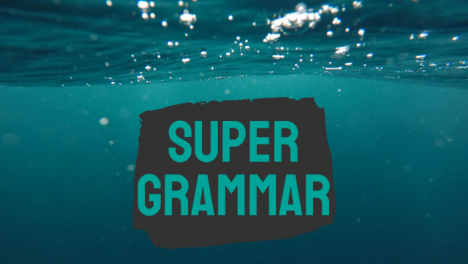
I know you’ve been dying to find out what nominalisations are since I mentioned them in the last Super Grammar. A nominalisation is simply a noun that has been formed by nominalising another part of speech. Now aren’t you glad I could clear that up for you?
Okay, okay. Let’s get serious. Macquarie Dictionary defines nominalise as to give a word or phrase the form or force of a noun. So it means you’re creating a noun from another part of speech, most often a verb. These created nouns are called nominalisations.
Some nominalisations are formed by using the suffixes -ance, -ence, -ity, -ment, -sions, -ism or -tion. In fact, nominalisation itself is a nominalisation of the verb nominalise.
Let’s look at some example sentences to make this clearer. Here are two sentences using verbs:
Here are the same sentences with nominalisations in place of the verbs:
Some nominalisations often used in business include cronyism instead of crony, governance for govern, sustainability in place of sustain, and maximisation instead of maximise.
Nominalisations can also be formed without a suffix. These are called zero-change nominalisations. Examples would be invite, ask, and change. In the last newsletter, I offered two other examples of zero-change nominalisations:
Nominalisations are sometimes referred to as zombie nouns because they cannibalise active verbs and make your writing weaker. Nominalisations place the emphasis on the action rather than who’s performing the action. They quite often need additional words, especially prepositions, to tell a reader who is doing what.
Consider the added preposition in this sentence:
This sentence could be stronger if written as:
The question is should you use nominalisations in your own writing? The answer is sometimes. Nominalisations aren’t always bad; sometimes they can help you express abstract ideas. Trying to describe these ideas with a verb can make your writing wordier.
Rather than using a verb:
Consider using a nominalisation to concisely express the same idea:
A nominalisation can also help you give an accompanying verb additional meaning. Consider the nominalisation used in this sentence:
It gives a little more information and sounds more assertive than:
Though nominalisations can occasionally be useful, I suggest analysing your writing to see if using verbs instead can make your writing more vibrant.
Wendy Wood
Proofreader
Did you enjoy Super Grammar?
Get a new and super useful grammar tip from our proofreader Wendy, directly to your inbox, once a fortnight in Typeset’s The Write Fit newsletter. Subscribe here:
